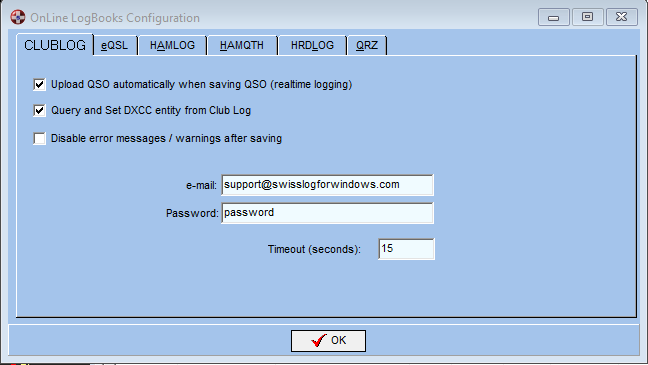
Online Logbooks
Swisslog supports realtime logging for the following online logbooks:
QRZ (subscription needed)
Broadcast QSO data via UDP messages to external programs or web services (such as HamAward) .
IMPORTANT: Club Log and eQSL requires SSL connections with TLS 1.2 which is only supported in Windows Vista or higher. If you have Windows XP all Club Log and eQSL functions will be disabled.
For LoTW and eQSL Swisslog implement a special synchronization functions. Please read these chapters: LoTW Support.and eQSL Support.
The table below shows the functions available for every online logbook:
| Add QSO | Delete QSO | Modify QSO | Logbook Upload | |
| Club Log | * | * | * | * |
| eQSL | * | Full synchronization | ||
| HAMLOG.EU | * | * | * | |
| HAMQTH | * | * | * | * |
| HRDLOG | * | * | * | * |
| QRZ | * | * | * |
This chapter is divided in 2 sections:
When a QSO has been succesfully uploaded to any online logbook, Swisslog will set the corresponding fields for every online logbook. For Club Log, HAMLOG.EU, HAMQTH, HRDLOG and QRZ it will set the following fields (where LOGBOOKNAME is the name of the online logbook):
In case of eQSL the following fields will be set:
Go to Options | Online Logbooks, select the corresponding tab and read the details for every online logbook:
IMPORTANT: If you have defined different My QTH with different callsigns, you have to add ALL your callsigns in your Club Log account (in your Club Log account go to Settings | Callsigns). Otherwise you will get an error if you try to save QSO in real time or upload your logbook using a callsign which doesn't exists in your Club Log account.

Query and Set DXCC entity from ClubLog: The Swisslog's country table is very well maintained and updated regularly offering a very accurated and updated DXCC allocations. However this option may be useful to retrieve the correct DXCC allocation for a very new DX operation from entities where currently you can't get the DXCC allocation by its callsign (i.e: VK9). Just in case there is not available a recent updated country table.
When activated (by default it's deactivated), when adding new QSOs or when a DX spot is received in the DX message window, Swisslog will perform a query to get the DXCC info from Club Log instead of the Swisslog's Country Table. This query is very accurated because the QSO Date is used for the query when adding new QSOs. In DX spots date used is when the DX spot is received.
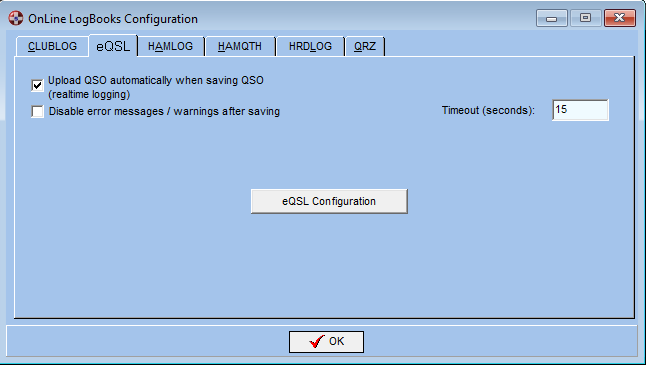
For eQSL Swisslog implements a special synchronization function. Read this chapter to know how to do it.
You can set the text to be specifically added as comments in your eQSL card. Please read Note field.
Swisslog implements an unique feature supporting multiple callsign configuration for HAMLOG.EU!
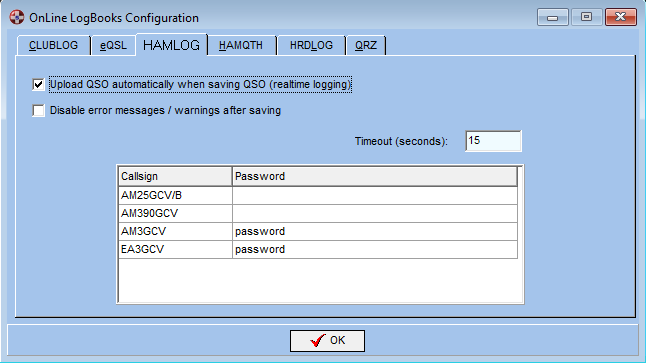
Swisslog also implements a function to upload your full/partial logbook to HAMLOG.EU (read HAMLOG.EU - Upload logbook).
IMPORTANT: If you have defined different My QTH with different callsigns, you have to add ALL your callsigns in your HAMQTH account (in your HAMQTH account go to Settings | Add New Callsign based on this). Otherwise you will get an error if you try to save QSO in real time or upload your logbook using a callsign which doesn't exists in your HAMQTH account.
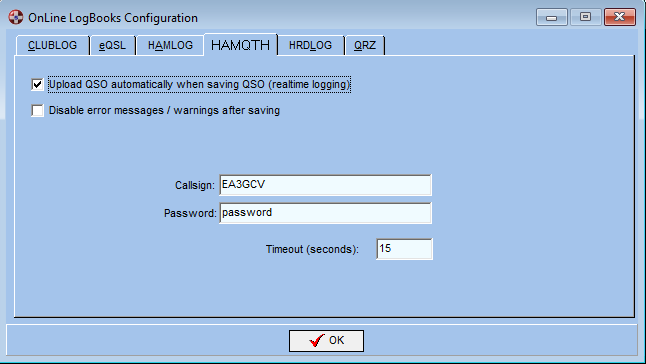
Swisslog also implements a function to upload your full logbook to HAMQTH (read HAMQTH - Upload logbook).
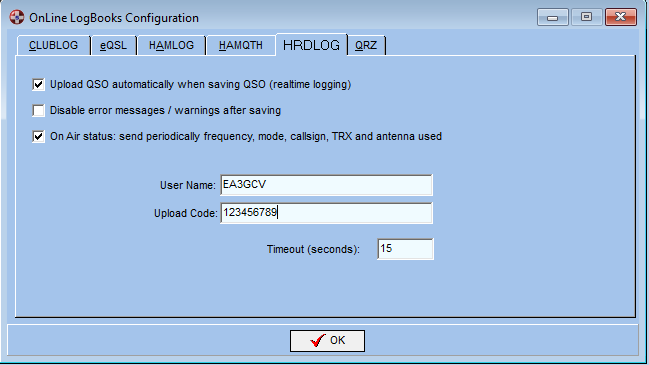
HRDLOG supports uploading QSO from different callsigns in the same HRDLOG account so you don't have to worry if you have defined different My QTH with different callsigns. Swisslog will do all the work for you.
Swisslog also implements a function to upload your full/partial logbook to HRDLOG (read HRDLOG - Upload logbook).
IMPORTANT: In order to save QSO in realtime in your QRZ Account you have to be a QRZ subscriber. This feature doesn't work for free users.
Swisslog has an unique feature supporting multiple callsign configuration for QRZ!
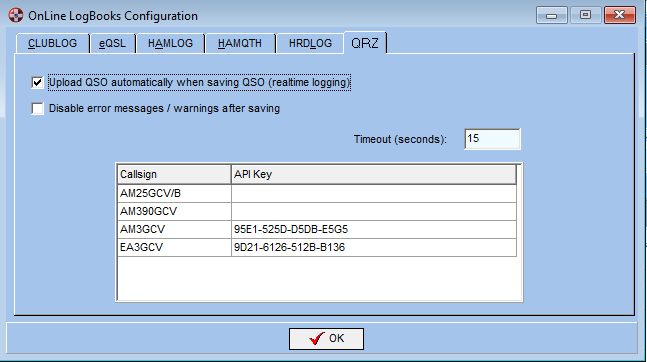
Swisslog also implements a function to upload your full/partial logbook to QRZ (read QRZ - Upload logbook).
After saving a QSO, you can send basic QSO fields to external programs or services (such as HamAward) via UDP message to any IP address / port in N1MM XML and/or ADIF Format (selectable).

Swisslog will send the following fields: Callsign, Date, Start Time, End Time, Band, QRG, Mode, RSTS, RSTR, QTH Locator, Operator, QTH, Comments, Prop Mode, Sat Name, MyCall and Operator Call (these last two fields are defined in MyQTH). This is a sample of a QSO in N1MM XML format:
<?xml version="1.0" encoding="utf-8"
standalone="yes"?>
<contactinfo>
<app>Swisslog</app>
<call>EA3GCV</call>
<timestamp>2024-03-15 16:52:26</timestamp>
<mycall>EA3GCV</mycall>
<operator>EA3GCV</operator>
<name>Jordi</name>
<qth>Sitges</qth>
<mode>PACKET</mode>
<band>420</band>
<rxfreq>43530800</rxfreq>
<txfreq>43530800</txfreq>
<snt>599</snt>
<rcv>599</rcv>
<gridsquare>JN01VF</gridsquare>
<propmode>SAT</propmode>
<satname>IO-117</satname>
<comment>This is sample of QSO</comment>
NOTE: N1MM XML format doesn't have a specific XML tag for Prop Mode and Sat Name. Swisslog sends these fields as satname and propmode.
Read this section here which is included in the Club Log Tools chapter.
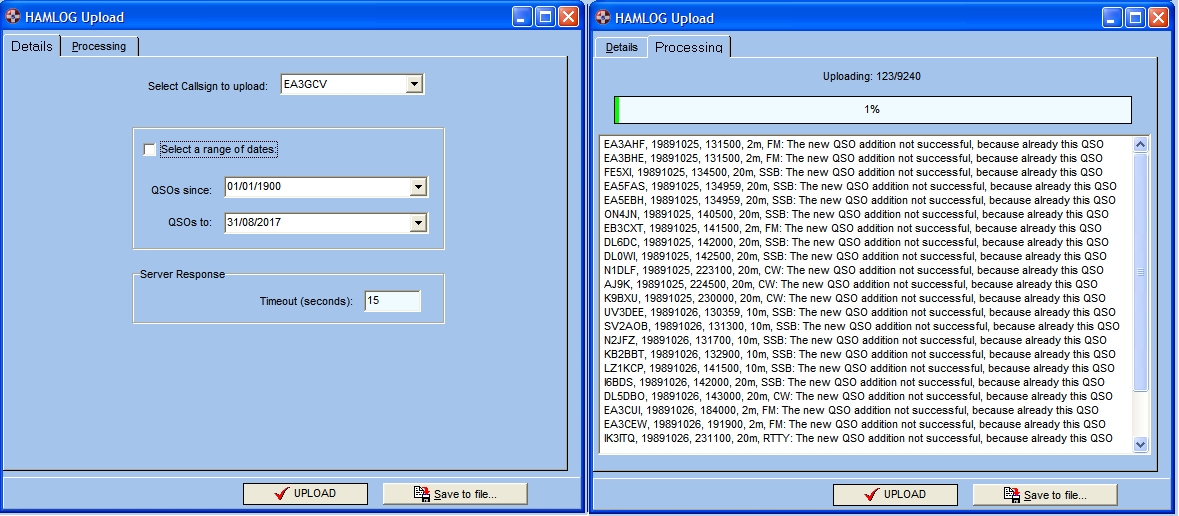
Use this function to upload your logbook into HAMLOG.EU. Select the callsign to upload from the dropdown list (contains all callsigns added in all your My QTH). QSO will be uploaded in sequence (one QSO after another) sorted by date.
NOTE: If you have not configured yet your HAMLOG.EU log in details in Options | Online Logbooks, Swisslog will prompt you to enter the log in details the first time you run this function.
You can upload QSO within a range of dates. This is useful in very large logbooks to split the upload by periods of time or when you import QSO from another program and you want to upload only these QSO instead of the full logbook. The range of dates used will be saved so that next time you open this function user knows the last range of dates used. If this option is not checked (unchecked by default) the full logbook will be uploaded.
Depending on your internet connection and server work load, the time response from server may vary. Set in the timeout field the maximum time (in seconds) you want to wait before skipping to the next QSO.The default timeout value is 15 seconds.
When you are ready press the Upload button. A progress bar is displayed indicating record number and total number of QSOs to be uploaded. Please note that only QSOs not previously uploaded with Swisslog (the ones with L_HAMLOG_QSO_UPLOAD_STATUS = 0) will be selected to upload. In case of any error it will be displayed below. At the end of the process you can save the list of errors in a text file. You can cancel the process at any time by closing the window.

Use this function to upload your full logbook into HAMQTH. Select the callsign to upload from the dropdown list (contains all callsigns added in all your My QTH).
NOTE: If you have not configured yet your HAMQTH log in details in Options | Online Logbooks, Swisslog will prompt you to enter the log in details the first time you run this function.
When you are ready press the Upload button. Swisslog will export all QSO from the selected callsign in an ADIF file (containing all fields accepted by HAMQTH) then uploaded to HAMQTH. HAMQTH doesn't support partial uploads, full logbook must be always uploaded. The ADIF file will be saved in the HAMQTH folder (located where Swisslog is installed) with your callsign and current date as file name in the following format: CALLSIGN_YYYYMMDD.ADI. If everything is OK you will get a message that your logbook has been uploaded successfully. Otherwise you will get an error message informing you what went wrong.
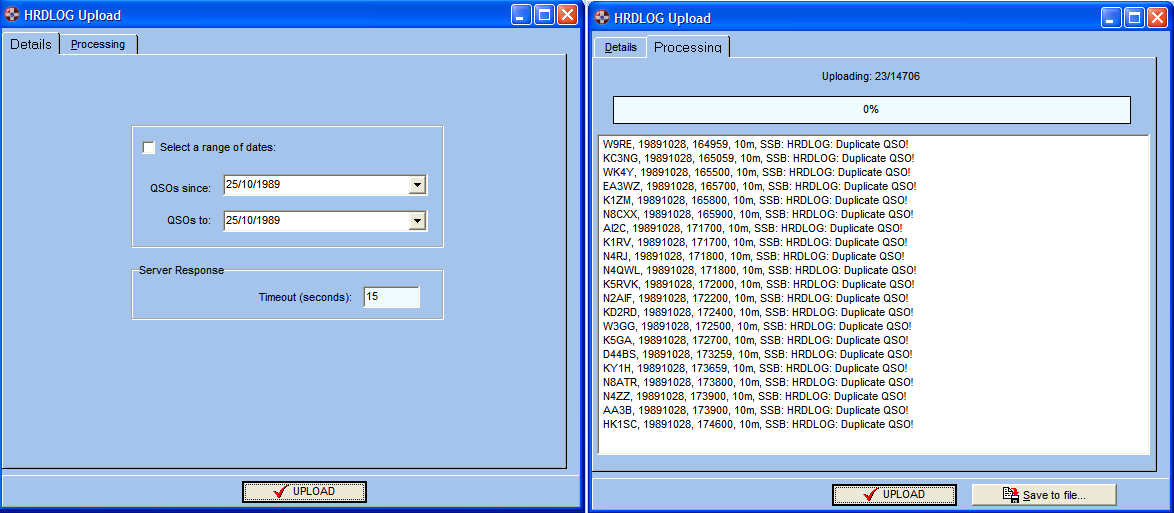
Use this function to upload your logbook into HRDLOG. QSO will be uploaded in sequence (one QSO after another) sorted by date.
NOTE: If you have not configured yet your HRDLOG log in details in Options | Online Logbooks, Swisslog will prompt you to enter the log in details the first time you run this function.
You can upload QSO within a range of dates. This is useful in very large logbooks to split the upload by periods of time or when you import QSO from another program and you want to upload only these QSO instead of the full logbook. The range of dates used will be saved so that next time you open this function user knows the last range of dates used. If this option is not checked (unchecked by default) the full logbook will be uploaded.
Depending on your internet connection and server work load, the time response from server may vary. Set in the timeout field the maximum time (in seconds) you want to wait before skipping to the next QSO.The default timeout value is 15 seconds.
When you are ready press the Upload button. A progress bar is displayed indicating record number and total number of QSOs to be uploaded. Please note that only QSOs not previously uploaded with Swisslog (the ones with L_HRDLOG_QSO_UPLOAD_STATUS = 0) will be selected to upload. In case of any error it will be displayed below. At the end of the process you can save the list of errors in a text file. You can cancel the process at any time by closing the window.
IMPORTANT: In order to upload your logbook in your QRZ Account you have to be a QRZ subscriber. This feature doesn't work for free users.
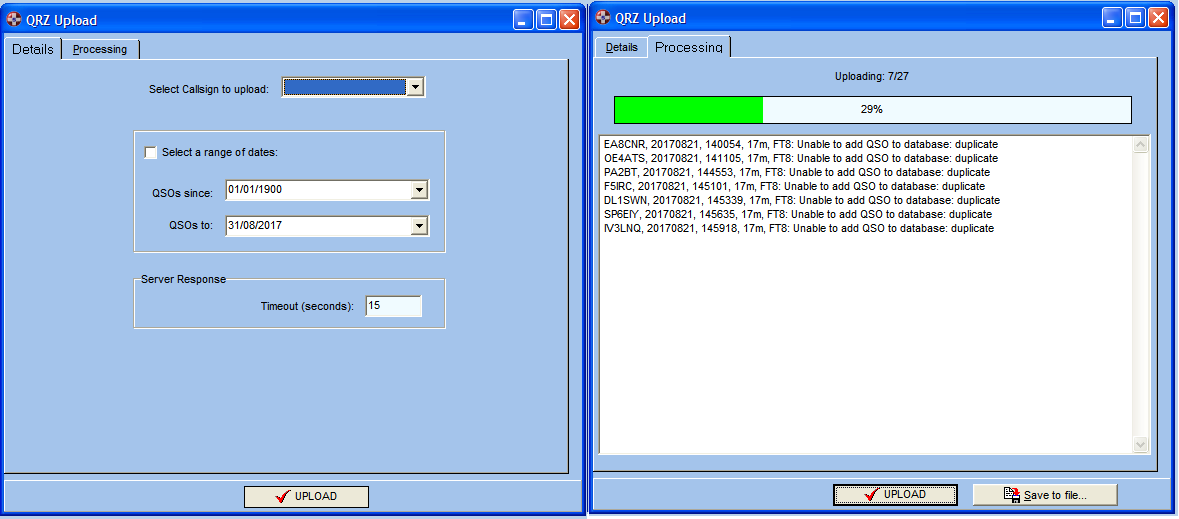
Use this function to upload your logbook into QRZ. Select the callsign to upload from the dropdown list (contains all callsigns added in all your My QTH). QSO will be uploaded in sequence (one QSO after another) sorted by date.
NOTE: If you have not configured yet your QRZ log in details in Options | Online Logbooks, Swisslog will prompt you to enter the log in details the first time you run this function.
You can upload QSO within a range of dates. This is useful in very large logbooks to split the upload by periods of time or when you import QSO from another program and you want to upload only these QSO instead of the full logbook. The range of dates used will be saved so that next time you open this function user knows the last range of dates used. If this option is not checked (unchecked by default) the full logbook will be uploaded.
Depending on your internet connection and server work load, the time response from server may vary. Set in the timeout field the maximum time (in seconds) you want to wait before skipping to the next QSO.The default timeout value is 15 seconds.
When you are ready press the Upload button. A progress bar is displayed indicating record number and total number of QSOs to be uploaded. Please note that only QSOs not previously uploaded with Swisslog (the ones with L_QRZCOM_QSO_UPLOAD_STATUS = 0) will be selected to upload. In case of any error it will be displayed below. At the end of the process you can save the list of errors in a text file. You can cancel the process at any time by closing the window.
Copyright © 2016 SWISSLOG
Last modified:
22 dic. 2025